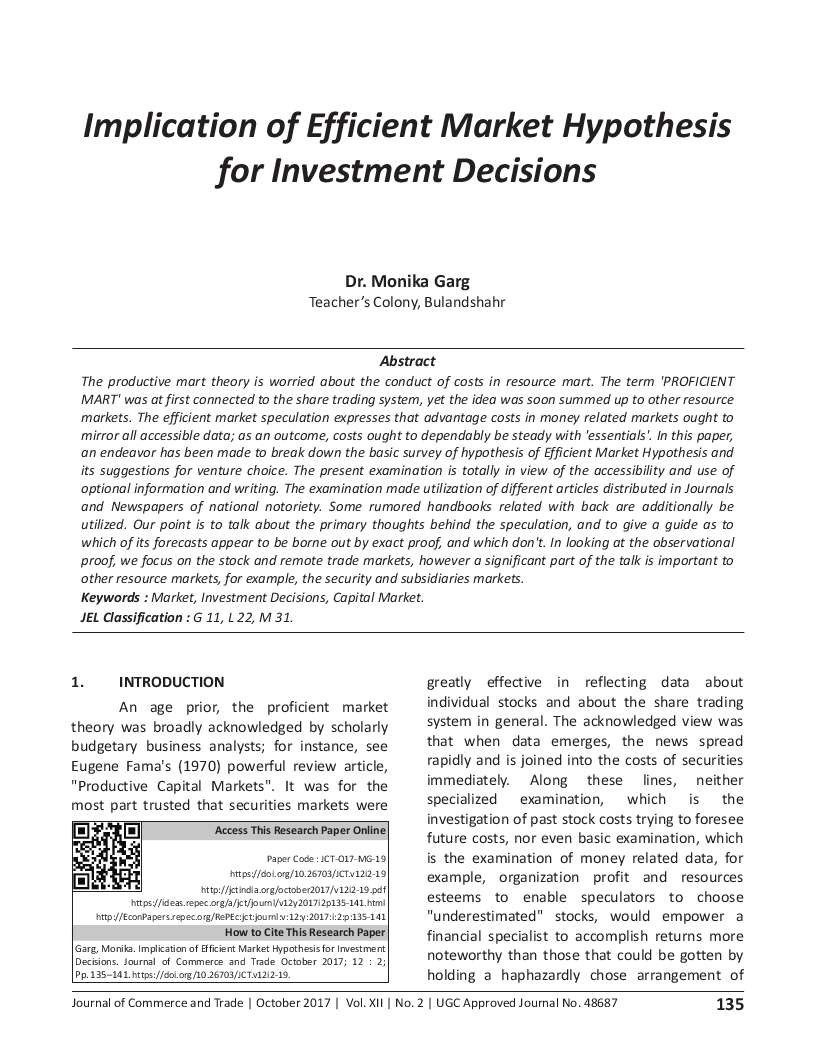Implication of Efficient Market Hypothesis for Investment Decisions
DOI:
https://doi.org/10.26703/jct.v12i2.170Keywords:
Market, Investment Decisions, Capital MarketAbstract
The productive mart theory is worried about the conduct of costs in resource mart. The term 'PROFICIENT MART' was at first connected to the share trading system, yet the idea was soon summed up to other resource markets. The efficient market speculation expresses that advantage costs in money related markets ought to mirror all accessible data; as an outcome, costs ought to dependably be steady with 'essentials'. In this paper, an endeavor has been made to break down the basic survey of hypothesis of Efficient Market Hypothesis and its suggestions for venture choice. The present examination is totally in view of the accessibility and use of optional information and writing. The examination made utilization of different articles distributed in Journals and Newspapers of national notoriety. Some rumored handbooks related with back are additionally be utilized. Our point is to talk about the primary thoughts behind the speculation, and to give a guide as to which of its forecasts appear to be borne out by exact proof, and which don't. In looking at the observational proof, we focus on the stock and remote trade markets, however a significant part of the talk is important to other resource markets, for example, the security and subsidiaries markets.
JEL Classification : G 11, L 22, M 31.
Downloads
References
Allen, F, Brealey, R, Myers, S. (2006) . Principle of corporate finance. New York: Mc Graw- Hill/Irwin
Allen, F, Brealey, R, Myers, S. ( 2011). Principles of corporate finance New York: Mc Graw- Hill/ Irwin
Bui, M. C. ( 2006) Testing the weak form market efficiency of the Vietnamese stock market . Master Thesis. Nottingham: University of Nottingham.
Dimson, E, Mussavian, M. (2000). Market efficiency. The current state of business disciplines,
vol. 3, p. 959-970.
Ahmad, N., Ahmad, Z. and Khan, S., (2011), “Behavioral Finance : Shaping the decisions of Small Investors of Lahore Stock Exchange”, Vol. 1 (2), pp 38-43.
DeBondt, W., and Thaler, R., (1985) “Does the Stock Market Overreact?” Journal of Finance, pp 793-805.
D. Jains and N. Dashora, (2012), “A Study on Impact of Market Movements on Investment Decision– An empirical analysis with respect to investors in Udaipur, Rajasthan”, Journal of Arts, Science and Commerce, 2(2), pp 78-88.
E. Bennet, M. Selvam, E. Ebenezer, V. Karpagam and S. Vanitha, (2011), “Investors’ Attitude on Stock Selection Decision”, IJMBS, Vol. 1, Issue 2, pp 7-15.
Gervais, S., (2009), “Behavioral finance : Capital Budgeting and the other Investment Decision “http://faculty.fuqua.duke.edu/~sgervais/Reserarch/Papers/BookChapter.OvCapitalBudgeting.pdf.
Markowitz, H., (1952), “The utility of wealth”, The Journal of Political Economy, 60, No. 2, pp 151-158.
Sharma Subhash (2007), “New Mantras in Corporate Corridors– From Ancient Roots to Global Roots”, New Age International, New Delhi.
Srivastava (2011), “Investors’ Attitude towards Secondary Market Equity Investments : A Study in Allahabad and Varanasi Cities”, Unpublished doctoral thesis, BanasthaliVidyapith.

Downloads
Published
Issue
Section
License
Copyright (c) 2017 Dr. Monika Garg

This work is licensed under a Creative Commons Attribution 4.0 International License.










